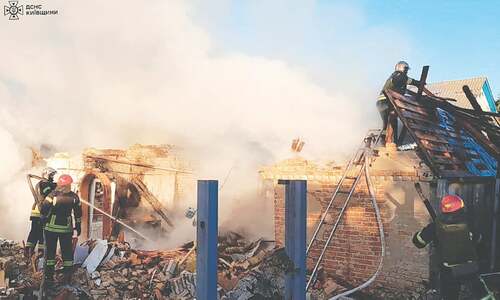NEW DELHI, April 25: India will resume military aid to Nepal unconditionally, dropping an earlier demand for King Gyanendra to first restore democracy, the Indian foreign ministry said on Monday. “This confirmation came from Indian Foreign Minister Natwar Singh.... The minister said India would resume arms supplies to Nepal,” said a ministry official.
A key ally of Congress Party-led coalition government, the Communist Party of India (Marxist), reacted sharply to the reports, saying it would be “wrong and unjustified”. “There should be no question of resuming arms supplies to a despotic king who suppressed the elementary democratic rights of the people,” the party said in a statement.
“The appreciation and goodwill it (India) earned with its firm stand in defence of democracy and popular government in Nepal will disappear and it will be held responsible for abetting (the) king’s authoritarianism,” the statement said.
Nepal was quick to welcome the move after nearly three months of acrimony between the traditionally close neighbours.
“It is a positive step of the Indian government and we welcome the decision,” said Gen Dipak Gurung, a spokesman for the Royal Nepal Army.
Private television channel NDTV said Natwar Singh briefed reporters on board a flight from Jakarta to New Delhi after an Asia-Africa summit that the ban on military supplies to Nepal would be lifted without condition.
New Delhi’s change in stance came after a meeting between the Nepalese king and Indian Prime Minister Manmohan Singh on the sidelines of the Asia-Africa summit in the Indonesian capital on Saturday.
During the meeting, King Gyanendra assured Singh that he would gradually lift the emergency and work towards establishing democratic processes.
In a story on Sunday, the Hindu newspaper said India had agreed to resume military aid and deliver a consignment “very soon” after King Gyanendra pledged to restore democracy “sooner than later” in Nepal.
India had previously sharply criticized King Gyanendra for sacking the government and suspending civil liberties on Feb 1, in a move the monarch said was needed because squabbling political parties were unable to end a raging Maoist insurgency that has claimed more than 11,000 lives since 1996.
Britain had also suspended military supplies and training after the king’s takeover. The United States and European Union called for the immediate restoration of democracy while reviewing aid programs to Kathmandu.
Ashok Mehta, a former Indian army general and expert on India-Nepal relations, said he was not surprised that India had decided to lift the arms embargo on Nepal.
“It (the resumption of arms supplies) had to happen sooner than later,” Ashok Mehta said.
“We could not have kept the supplies blocked indefinitely, having undertaken to modernize the Royal Nepalese Army we could not back out.”
But Ashok Mehta expressed doubts whether India had agreed to resume military supplies without “conditions”.
“I would think this is failure of our diplomacy if we cannot make the king at least meet some conditions.... If it’s done unconditionally it is a complete turnaround for the Congress, which has traditionally been tough with the monarchy,” he said.—AFP
















































Dear visitor, the comments section is undergoing an overhaul and will return soon.